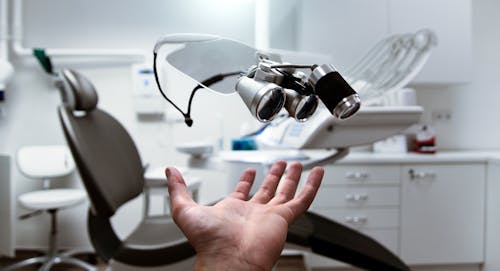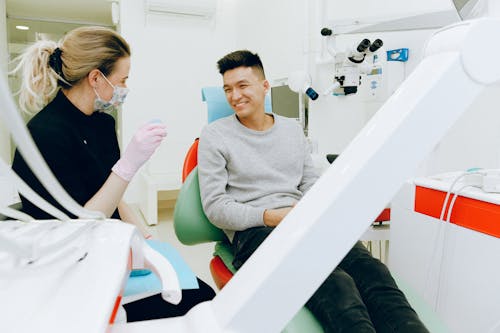
28 Jun Why Routine Dental Cleanings Are Important
It May Be Time For You To Visit The Dentist
In truth, you’ve probably forgotten the little appointment card that you were given at the last dentist appointment, or you have completely ignored the calls from your dentist’s office.
If it’s been more than six months since you’ve seen a dentist, now is the time to schedule an appointment. Professional dental cleanings aren’t just for keeping your smile bright; they can have a significant impact on your general health. Insufficient oral hygiene has been linked to several serious illnesses. Associated medical and dental issues include bone loss, cardiovascular disease, strokes, cancers, and many other problems. Brushing and flossing at home are essential, but to ensure teeth are healthy and thoroughly clean, you should schedule regular check-ups with your dentist and annual dental cleanings with your dental hygienist.
A routine dental cleaning is a simple and painless procedure that can help keep your teeth and gums healthy. The cleaning involves removing plaque and tartar from your teeth, as well as polishing your teeth to make them look their best. Plaque is a sticky film of food debris, bacteria, and saliva. If plaque isn’t removed, it can harden and turn into tartar. Tartar can only be removed with special instruments. If tartar isn’t removed, it can lead to gum disease.
Gum disease is an infection of the tissues that surround and support your teeth. Gum disease begins when plaque is not removed and causes irritation of the gums. This can progress to gingivitis, which is an early stage of gum disease characterized by redness, swelling, and bleeding gums. If gingivitis isn’t treated, it can advance to periodontitis, which is a more serious form of gum disease that can lead to tooth loss.
In addition to causing gum disease, plaque and tartar can also lead to other problems such as bad breath, tooth decay, and enamel erosion. Professional cleanings can help remove plaque and tartar before it leads to these problems.

Here’s What You Can Expect During A Typical Dental Cleaning
Your dentist or hygienist will start by using a small mirror to examine your teeth and gums. They will then use a scaler to remove any plaque or tartar from your teeth. Plaque is a sticky film of bacteria that can build up on your teeth, while tartar is hardened plaque that has been left on your teeth for too long.
Next, your dentist or hygienist will use a special toothbrush to clean your teeth. This brush is called an ultrasonic scaler and it emits vibrations that help to remove any remaining plaque or tartar.
Finally, your dentist or hygienist will polish your teeth. This step helps to remove any stains or discoloration on your teeth, as well as give them a bright, healthy appearance.
After your cleaning is complete, your dentist may recommend that you use a fluoride mouthwash or toothpaste to help keep your teeth healthy. They may also suggest that you have a professional cleaning every six months to prevent plaque and tartar from building up again.

Routine Dental Cleanings Are An Important Part Of Maintaining Good Oral Health
And you made be thinking that you are fine because you aren’t experiencing any pain or discomfort and your teeth aren’t showing obvious forms of decay. However, there are things behind the scenes going on with your mouth and teeth that need to be checked professionally. So, let’s take a look at some reasons why these cleanings are important.
1. Routine dental cleanings help remove plaque and tartar from your teeth, which can prevent cavities and gum disease.
We’ve mentioned how a professional cleaning by a dentist or dental hygienist can remove plaque and tartar that has built up on your teeth over time.
Brushing and flossing regularly can help remove plaque, but it’s not always possible to remove all of the plaque and tartar on your own. A professional cleaning will give your teeth a deeper clean and help keep them healthy.
If you have gum disease, routine dental cleanings can also help keep it under control. Gum disease is an infection of the gums that can cause tooth loss. Regular cleanings can help remove the bacteria that causes gum disease and help keep your gums healthy.
If you have cavities, routine dental cleanings can also help prevent them from getting worse. Cavities are holes in your teeth that are caused by decay. The decay occurs when plaque and tartar build-up on your teeth and the acids in plaque damage the enamel.
2. Dental cleanings can also help to brighten your smile by removing stains from your teeth.
Over time, our teeth can become stained from the foods and drinks we consume. Professional teeth cleanings remove these stains, leaving your teeth looking brighter and cleaner.
3. Regular dental cleanings can help to prevent bad breath by keeping your mouth free of bacteria.
Most people are aware that regular dental cleanings can help prevent cavities and gum disease. However, few realize that these cleanings can also help to keep bad breath at bay. This is because bacteria are one of the main causes of bad breath. When bacteria build up in your mouth, they release foul-smelling compounds that can cause your breath to smell unpleasant. By getting rid of this bacteria with regular cleanings, you can keep your breath smelling fresh and clean. First, make sure to brush and floss your teeth regularly. This will help remove any food particles or plaque that may be harboring bacteria. But remember to follow up your personal cleaning with professional care.
4. Dental cleanings can also help you to avoid costly dental procedures in the future by keeping your teeth and gums healthy.
According to the Mayo Clinic, regular dental cleanings can help prevent gum disease, tooth decay, and other problems. If left untreated, gum disease can lead to tooth loss. Tooth decay is also caused by plaque. Additionally, during a professional cleaning, your dentist or hygienist will check for signs of oral cancer, which is easier to treat when caught early.
5. Dental cleanings are also a great opportunity for your dentist to check for any potential problems with your teeth or gums and to give you tips on how to improve your oral health.
Dental cleanings are a great opportunity for your dentist to give you tips on how to improve your oral health. Here are some tips that your dentist may give you:
- Brush properly. Be sure to brush your teeth at least twice a day using a soft-bristled toothbrush. Use circular motions and gentle pressure to avoid damaging your gums.
- Floss daily. Flossing removes plaque and bacteria from areas that your toothbrush can’t reach. Be sure to use a gentle flossing motion to avoid harming your gums.
- Eat a healthy diet. Eating a diet rich in fruits, vegetables, and whole grains helps keep your teeth and gums healthy. Avoid sugary and acidic foods, as they can damage your teeth.
- Quit smoking. Smoking is a leading cause of gum disease. If you smoke, talk to your dentist about ways to quit.
6. Finally, routine dental cleanings are simply a good way to maintain your overall oral health and hygiene.

Look Out For Your Future!
By getting your teeth cleaned on a regular basis, you can help to ensure that your mouth is healthy and free of any problems. While many people view dental cleanings as a necessary evil, the truth is that they are an important part of maintaining good oral health. Therefore, it is important to get regular dental cleanings as part of your overall oral care routine. Even if you can’t see it or feel it, your mouth and teeth need attention that your dentist can provide. You will be thankful in the long run that you did what you could to protect your oral health.


Sorry, the comment form is closed at this time.